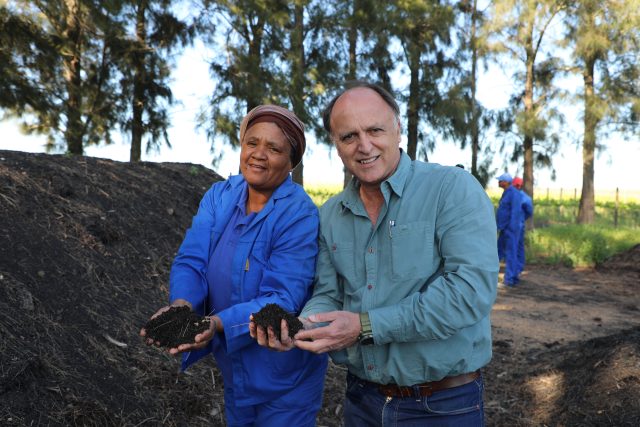This website uses cookies so that we can provide you with the best user experience possible. Cookie information is stored in your browser and performs functions such as recognising you when you return to our website and helping our team to understand which sections of the website you find most interesting and useful.
Nederburg digs deep
Nederburg in Paarl Valley has a long and illustrious history, and in recent decades it has been a pioneering force for sustainable winemaking in South Africa.

Dating back to 1791, Nederburg is one of the longest-lived wineries outside of Europe. ISO14000 certified for responsible environmental management, it was also granted WWF Conservation Champion status for water stewardship in 2020. Sustainability has been integral to operations for more than two decades now. Ahead of its launch in 1998, Nederburg served as a pilot farm for the Integrated Production of Wine programme, and success there encouraged wineries across South Africa to participate.
Distell agricultural specialist Henk van Graan focuses on holistic, low-intervention agriculture. Through his work he understands that the story begins from below the ground up: “When I studied viticulture in the 1990s, soil wasn’t given that much emphasis. In those days, it was considered more of a planting medium to be treated with appropriate interventions for optimal vine growth. It’s only in recent years that awareness about intrinsic soil life and health has grown, and with it an awareness of the connection to climate resilience and food security.”
“We’ve come to understand that around 70% of the earth’s microorganisms exist below the surface of the ground. That’s more diversity below than above ground. To consider this on a micro-scale, can you imagine that there can be more than 25,000 species of microorganisms in a single teaspoon of soil.”
While indigenous microorganisms are naturally present, it takes a special effort to ensure that these communities truly flourish, and will continue to do so for centuries to come.
Biochar, described by former mechanical engineer and horticultural expert Wae Nelson as “the oldest new thing you’ve never heard of”, is a portmanteau of the words ‘bio’ and ‘charcoal’. Made in a process known as pyrolysis, where plant material and wood are charred in a low oxygen environment at temperatures in excess of 400°C, biochar is carbon negative due it being a highly stable method for both removing Carbon Dioxide from the atmosphere and storing carbon in soils.
“We saw all these materials coming from the cellar as waste,” van Graan explains. “The stems and pommace and everything and I said ‘why is it lying here and what can we do with it?’ So eventually, as part of waste management, we can also use it for our soils to make compost from it.”
This compost is mixed with biochar made out of everything from staves from old barrels to grape stems, and recycled water before then being inoculated with nutrients and beneficial organisms.
Biochar is fundamentally cyclical in nature: what gets taken out of the vineyard ultimately ends up back there, with added benefits. Because of biochar’s porous nature, it retains and aggregates water resulting in a healthy ecosystem of microorganisms in the soil. It’s also very pertinent given South Africa’s susceptibility to drought, meaning that Nederburg wastes less water through irrigation and the vines remain healthy, which further benefits the overall health of the soil.
Though biochar is an ancient method that has been used in the Amazon for millenia, modern science has unravelled the workings of the symbiotic relationships that result from it: “In some ways it represents a whole new frontier for modern farmers,” van Graan says. “Especially as we deepen our knowledge of mycorrhizal networks, where microorganisms in the root systems of plants connect individual plants together and transfer water, Carbon, Nitrogen, and other nutrients and minerals.”
One major testament to how everything in the vineyard is interconnected is how, thanks to healthy soils, the use of insecticides, pesticides and herbicides can be substantially reduced. Healthier soils result in improved cover crops which attract insects that keep pest populations down. As a result, the vines thrive and the wine that ends up in your glass is better.
Through his work with Nederburg, van Graan has gained a renewed sense of wonder about the very earth we stand on, and depend on for everything we eat and drink: “I’m always surprised by those who see Mars as our next frontier for exploration. What about the ground beneath our feet? We’re just beginning to learn how rich and diverse it is. It’s literally crammed with information on which our survival as a planet depends. Shouldn’t that be the quest we make our priority?”

